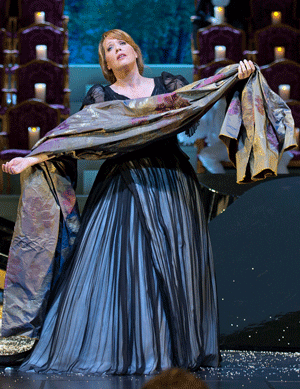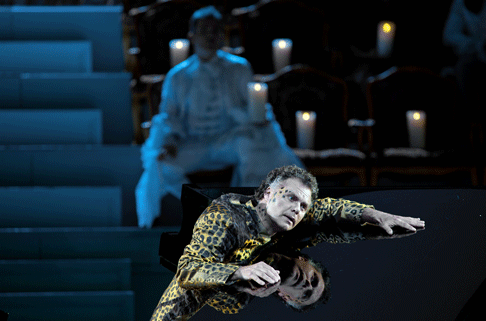![Michael Laurenz (Scaramuccio), Gabriel Bermúdez (Harlequin), Elena Moșuc (Zerbinetta), Martin Mitterrutzner (Brighella), Tobias Kehrer (Truffaldino)[Photo © Ruth Walz]](http://www.operatoday.com/ARIADNE_AUF_NAXOS0084a.gif)
20 Aug 2012
Ariadne auf Naxos, Salzburg Festspiele
When announced in November, this was trailed as the original version of Ariadne auf Naxos, a rare treat indeed.
English Touring Opera are delighted to announce a season of lyric monodramas to tour nationally from October to December. The season features music for solo singer and piano by Argento, Britten, Tippett and Shostakovich with a bold and inventive approach to making opera during social distancing.
This tenth of ten Live from London concerts was in fact a recorded live performance from California. It was no less enjoyable for that, and it was also uplifting to learn that this wasn’t in fact the ‘last’ LfL event that we will be able to enjoy, courtesy of VOCES8 and their fellow vocal ensembles (more below …).
Ever since Wigmore Hall announced their superb series of autumn concerts, all streamed live and available free of charge, I’d been looking forward to this song recital by Ian Bostridge and Imogen Cooper.
Although Stile Antico’s programme article for their Live from London recital introduced their selection from the many treasures of the English Renaissance in the context of the theological debates and upheavals of the Tudor and Elizabethan years, their performance was more evocative of private chamber music than of public liturgy.
Evidently, face masks don’t stifle appreciative “Bravo!”s. And, reducing audience numbers doesn’t lower the volume of such acclamations. For, the audience at Wigmore Hall gave soprano Elizabeth Llewellyn and pianist Simon Lepper a greatly deserved warm reception and hearty response following this lunchtime recital of late-Romantic song.
For this week’s Live from London vocal recital we moved from the home of VOCES8, St Anne and St Agnes in the City of London, to Kings Place, where The Sixteen - who have been associate artists at the venue for some time - presented a programme of music and words bound together by the theme of ‘reflection’.
'Such is your divine Disposation that both you excellently understand, and royally entertaine the Exercise of Musicke.’
‘And there was war in heaven: Michael and his angels fought against the dragon; and the dragon fought and his angels, And prevailed not; neither was their place found any more in heaven … that old serpent … Satan, which deceiveth the whole world: he was cast out into the earth, and his angels were cast out with him.’
There was never any doubt that the fifth of the twelve Met Stars Live in Concert broadcasts was going to be a palpably intense and vivid event, as well as a musically stunning and theatrically enervating experience.
‘Love’ was the theme for this Live from London performance by Apollo5. Given the complexity and diversity of that human emotion, and Apollo5’s reputation for versatility and diverse repertoire, ranging from Renaissance choral music to jazz, from contemporary classical works to popular song, it was no surprise that their programme spanned 500 years and several musical styles.
The Academy of St Martin in the Fields have titled their autumn series of eight concerts - which are taking place at 5pm and 7.30pm on two Saturdays each month at their home venue in Trafalgar Square, and being filmed for streaming the following Thursday - ‘re:connect’.
The London Symphony Orchestra opened their Autumn 2020 season with a homage to Oliver Knussen, who died at the age of 66 in July 2018. The programme traced a national musical lineage through the twentieth century, from Britten to Knussen, on to Mark-Anthony Turnage, and entwining the LSO and Rattle too.
With the Live from London digital vocal festival entering the second half of the series, the festival’s host, VOCES8, returned to their home at St Annes and St Agnes in the City of London to present a sequence of ‘Choral Dances’ - vocal music inspired by dance, embracing diverse genres from the Renaissance madrigal to swing jazz.
Just a few unison string wriggles from the opening of Mozart’s overture to Le nozze di Figaro are enough to make any opera-lover perch on the edge of their seat, in excited anticipation of the drama in music to come, so there could be no other curtain-raiser for this Gala Concert at the Royal Opera House, the latest instalment from ‘their House’ to ‘our houses’.
"Before the ending of the day, creator of all things, we pray that, with your accustomed mercy, you may watch over us."
The doors at The Metropolitan Opera will not open to live audiences until 2021 at the earliest, and the likelihood of normal operatic life resuming in cities around the world looks but a distant dream at present. But, while we may not be invited from our homes into the opera house for some time yet, with its free daily screenings of past productions and its pay-per-view Met Stars Live in Concert series, the Met continues to bring opera into our homes.
Music-making at this year’s Grange Festival Opera may have fallen silent in June and July, but the country house and extensive grounds of The Grange provided an ideal setting for a weekend of twelve specially conceived ‘promenade’ performances encompassing music and dance.
There’s a “slide of harmony” and “all the bones leave your body at that moment and you collapse to the floor, it’s so extraordinary.”
“Music for a while, shall all your cares beguile.”
The hum of bees rising from myriad scented blooms; gentle strains of birdsong; the cheerful chatter of picnickers beside a still lake; decorous thwacks of leather on willow; song and music floating through the warm evening air.
![Michael Laurenz (Scaramuccio), Gabriel Bermúdez (Harlequin), Elena Moșuc (Zerbinetta), Martin Mitterrutzner (Brighella), Tobias Kehrer (Truffaldino)[Photo © Ruth Walz]](http://www.operatoday.com/ARIADNE_AUF_NAXOS0084a.gif)
When announced in November, this was trailed as the original version of Ariadne auf Naxos, a rare treat indeed.
What materialised was something rather different, which ultimately delivered less than it might have seemed to promise. The Salzburg Festival’s Director of Drama not only directed the stage proceedings, but offered a new version of his own. Hofmannsthal’s adaptation of Molière’s Le bourgeois gentilhomme is itself adapted so as to form the basis of a further level of metatheatricality. Nothing wrong with that in principle; indeed Strauss tends to thrive on such æsthetic play.
 Emily Magee (The Prima Donna/Ariadne)
Emily Magee (The Prima Donna/Ariadne)
The problem, however, is that the new level is ultimately banal, an explanation of the enterprise being a Hollywood love-story between Hofmannsthal and Ottonie von Degenfeld-Schonburg. What most interests many of us about Strauss is the fraught relationship, and sometimes serene disconnection dialectically reinforcing itself as in connection, between life and work. Presentation of a vulgar, sub-Romantic ‘life explains works’ story cheapens rather than intrigues. Otherwise, Bechtholf’s production is unobjectionable. Rolf Glittenberg’s set designs are stylish, likewise Marianne Glittenberg’s costumes, save for an unfathomably dreadful leopard-skin get up for Bacchus. (Zerbinetta likens his stealing forward to that of a panther, but even so…)
Added to this mix prior to the interval are certain parts of the later, 1916 Prologue, albeit spoken. What a waste to reduce the Composer to a spoken part! At least, however, we have opportunity to hear the incidental music. Then, after the interval, comes the opera proper, albeit with interventions from Hofmannsthal and Ottonie — yes, their love bears fruit at the same time as that of Ariadne and Bacchus — and, more irritatingly, from the dreadful M.Jourdain, objecting, in a fashion doubtless considered ‘witty’, that the music might be beautiful but it lacks a French horn, that Ariadne does nothing but complain, and so on. Many of these ideas might have sounded good on paper, even in discussion, but would have been better off rejected when it came to practical rehearsal. Yes, we hear the opera music for 1912, but we do not hear it as conceived: a pity, when even this problematical first version is so manifestly greater in sophistication than this 2012 Salzburg ‘version’. It was fascinating to hear what remained from 1912, but it would have been still more fascinating to have heard it all.
 Roberto Saccà (Tenor/Bacchus)
Roberto Saccà (Tenor/Bacchus)
After an occasionally shaky start, the Vienna Philharmonic was on good form. Daniel Harding shaped the incidental music before the interval with knowledge both of its French Baroque origins and the affectionate almost-but-not-quite neo-classicism in which Strauss clothes it. The Overture in retrospect offered something of an exception, more Stravinskian than what was to come, but not jarringly so. Form was conveyed intelligently and meaningfully throughout the opera, a more than satisfactory balance achieved between ‘numbers’ and the greater whole. The final climax was thrilling, moving as it should, the chamber orchestral forces persuading one, in a moment of echt-Straussian magic, that they are larger than they are, both consequence and deflation of Wagner’s examples. (The earlier Tristan quotations did not fail to delight, nor, of course, to raise a smile.)
Emily Magee was an adequate Ariadne, but rarely more than that. Too often, her voice failed to soar as it should; an edge to it proved a touch unpleasant. Elena Moşuc, by contrast, proved an outstanding Zerbinetta. Her extended aria, up a semitone, was delivered as flawlessly as I can recall any performance of the somewhat easier — that is, of course, relative! — 1916 version. The 1912 aria is even more outsized, even more absurd, in its way even more lovable; at least, that was how it sounded here. Roberto Saccà did a fine job in the thankless role of Bacchus; if he could not quite manage to prevent the strain from showing, and could not quite help one long for Jonas Kaufmann, who performed the role earlier in the run, there was a great deal for which to be grateful and nothing which to object. (Apart, that is, from the costume.) Zerbinetta’s followers were full of character and inviting of tone; it would really be invidious to choose between Gabriel Bermúdez, Michael Laurenz, Tobias Kehrer, and Martin Mitterrutzner. Likewise the other smaller sung roles. If the actors impressed less, it was difficult to know whether that was simply on account of the material. At any rate, I assume the over-acting of Cornelius Obonya’s M. Jourdain was at least in part on directorial instruction.
Will someone now offer us the 1912 version we were promised? And then we can return safely to the unalloyed joys of 1916.
Mark Berry